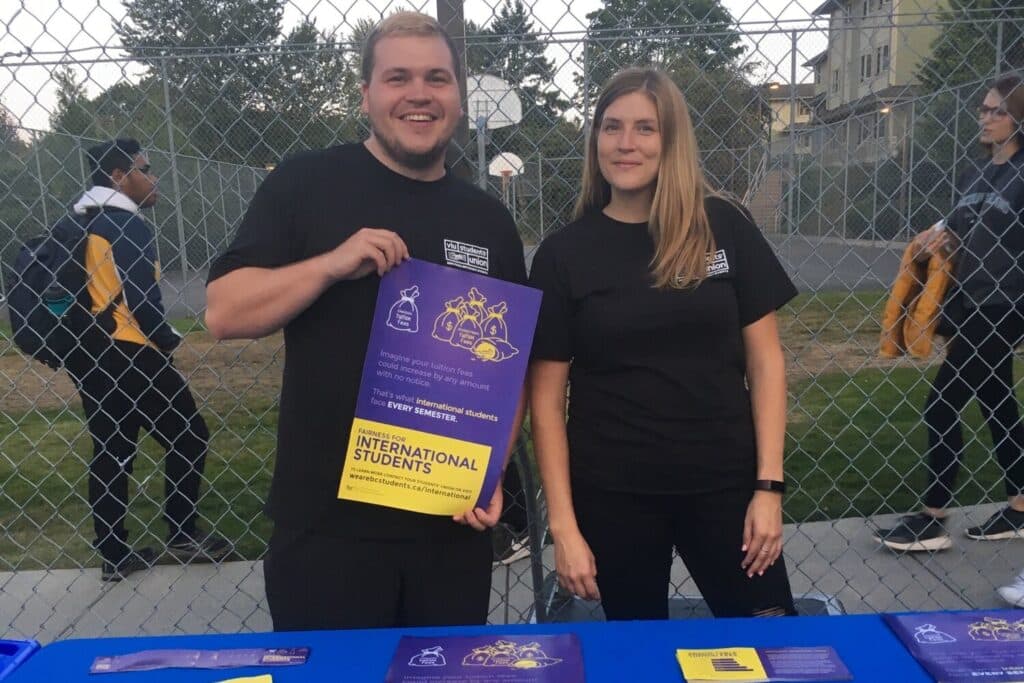
Post-secondary education can be a powerful way for people to open up new opportunities. But for many, the cost of getting an education is a major hurdle.
That’s why student unions in B.C. and across the country are fighting to help students in big and small ways to manage their money, navigate financial systems and reduce the cost of getting an education.
Some of this work includes offering support to boost students’ financial literacy, says Sydney Sullivan, the Vancouver Island University Students’ Union’s (VIUSU) organizer of strategic priorities and governance.
“We run a yearly program during tax season where we partner with VIU accounting students and tax services here in the city,” says Sullivan. The volunteers walk students through the tax filing process and help them understand the tax benefits they qualify for.
The student union is also available to support students to navigate the Canadian banking system, Sullivan says.
“It’s such a barrier for some international students.” They may be navigating systems that are new to them, or struggling to access funds from an international account. “Maybe they thought they could just withdraw from their home bank and pay tuition. But that’s not accessible and tuition is coming due.”
While student education and support continues to grow, “It’s not going to fix the big money barriers students face. But it can help you navigate through those barriers,” Sullivan says.
“Knowing how to be smart with your money, how to save and budget, only goes so far.”
Student unions claim big wins on eliminating loan interest
Many people can’t access post-secondary education without student loans, and in that context the “Interest rate then just becomes a tax on poor people,” Sullivan says.
In recent years, VIUSU joined with student unions across the country to campaign for the elimination of interest on student loans. And they won. The B.C. government eliminated interest on student loan debt as of February, 2019. The Government of Canada stopped charging interest on student loans in 2021, in response to financial impacts of the COVID-19 pandemic. That suspension was set to expire in March 2023, but late last year the government announced that interest would be eliminated permanently.
But the fight isn’t over. Sullivan says the focus is now on increasing government funding for post secondary institutions and lowering tuition fees. VIUSU, along with other student unions, are asking the B.C government to add $200 million to the post-secondary budget. The infusion would bring funding for post-secondary education back to where it was before funding cuts by the Liberal government in the mid 2000s.
Although the budget is currently under review, Sullivan says there’s currently no indication that the province intends to boost the funding.
“Our understanding is that essentially there’s not going to be more pie, the pie is just going to be re-divided.”
The student unions have additional goals for the future, too. They plan to push for universities to freeze tuition fees at the current level and plan for later reductions. But this is a long-term goal, Sullivan says.
Student advocacy is important work, but it can be draining, Sullivan says. “We need students and graduates to help campaign for a more financially accessible post secondary education. But those students are also trying to survive what is becoming an increasingly stressful situation. It’s hard to advocate when you’re a full time student and working and dealing with life things.”
But as long as money remains a major barrier to education, the fight will continue. “Things need to change,” Sullivan says.
This reporting was made possible through the financial support of Coast Capital, a member-owned cooperative. The article was produced with full editorial independence; Coast Capital was not involved in the story selection, reporting and editing process.



